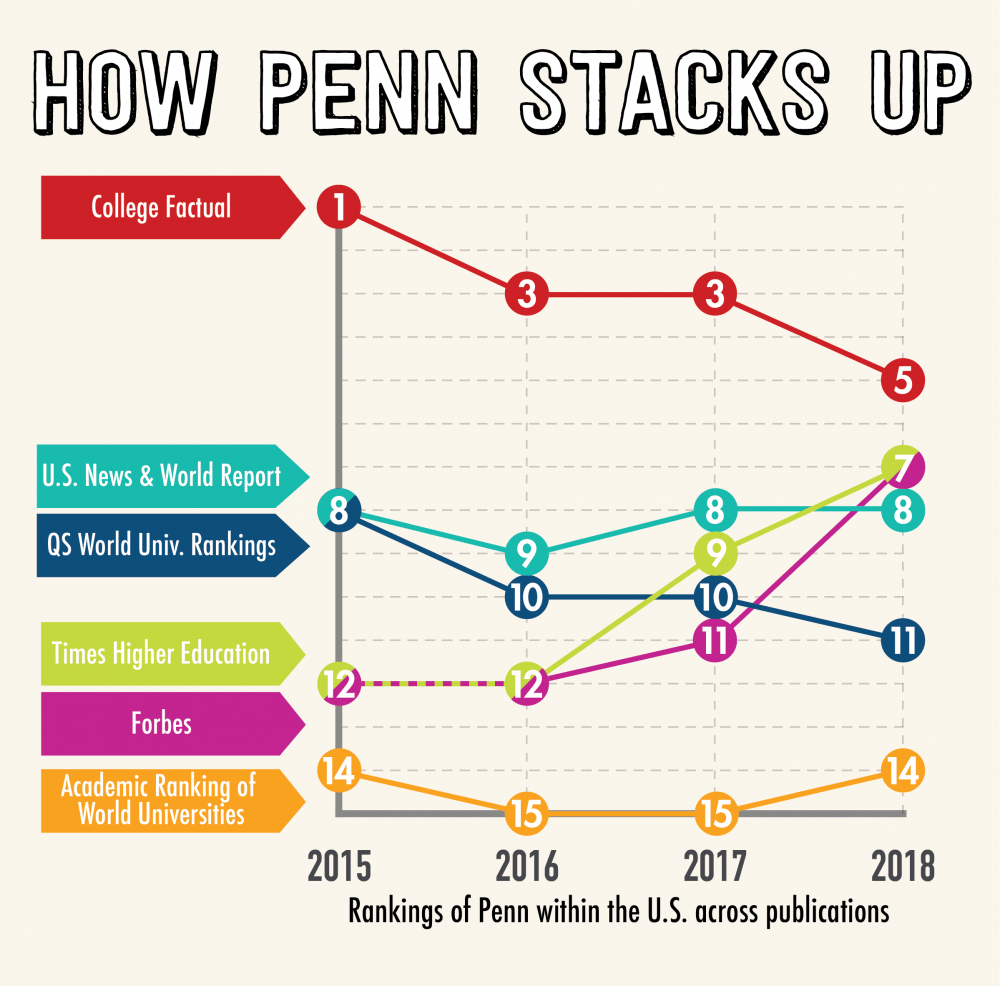Penn remains at No. 8 in the 2018 edition of the U.S. News and World Report National Universities ranking, which was released early Tuesday morning.
Despite some small rises and falls, most of the top universities kept their ranks from last year. For the seventh year in a row, Princeton University topped the list, and it is the sixth year Harvard University finished in second.
The Massachusetts Institute of Technology jumped from No. 7 in the 2017 ranking to the No. 5 ranking, which it shares with Columbia University and Stanford University. Yale University and Dartmouth College remain at No. 3 and No. 11, respectively.
In the 2017 ranking, Penn tied with Duke University for the eighth spot, but Duke dropped to No. 9 this year.
In an emailed statement, Penn Dean of Admissions Eric Furda noted that, "Rankings certainly shape the perception of prospective students, families and to an extent alumni."
"It's always good to see Penn's excellence recognized," Furda wrote. "But each ranking evaluates colleges and universities differently. I believe that students should first look within themselves to conduct a thoughtful, personalized assessment. That's what can really help them understand what they want out of their college experience and hone in on the colleges that might be the best fit for them, regardless of rankings."
"For many students [the ranking is] the Bible of which school is more competitive than the next," said Brian Taylor, managing director of the college counseling service Ivy Coach. "Particularly in other parts of the world, notably China. Chinese parents rely on the USNWR rankings."
Taylor cited Brown University as an example of an Ivy League university that is not well-known in China because of its comparatively lower USNWR ranking — No. 14, tied with Cornell University.
RELATED:
Penn named 10th best university in the world, according to latest set of college rankings
Penn lags behind many of its peers in affordability and access rankings
Taylor maintained that although most American applicants do not rely on USNWR as exclusively as Chinese applicants do, it still has a great deal of influence in the U.S., calling it the "kingpin" of college rankings.
Yield rate, acceptance rates, average SAT/ACT scores and average GPA are some of the metrics that influence a college's USNWR ranking.
Taylor said Penn is one of many schools that sends promotional materials "to students who have no shot of earning admission to Penn.” The hope, Taylor said, is that more students would apply, and, in turn, Penn's acceptance rate would decrease. By extension, the USNWR ranking would also inflate.
“The number of students who apply each year is such an important factor in USNWR,” Taylor said. “Something as silly as how far a team advances in March Madness can have a major impact on a school’s USNWR ranking.”
On Sept. 10, Politico published a piece arguing that USNWR rankings "promote economic inequality on campus," as the rankings encourage colleges to accept applicants with higher SAT scores. These applicants tend to be wealthier than their peers because SAT and ACT scores are correlated with income.
Taylor, however, said he does not think that USNWR is primarily to blame for this phenomenon.
"Every highly selective school with the exception of a few that are test-optional requires the SAT or ACT," Taylor said. "To single out U.S. News isn't right."



